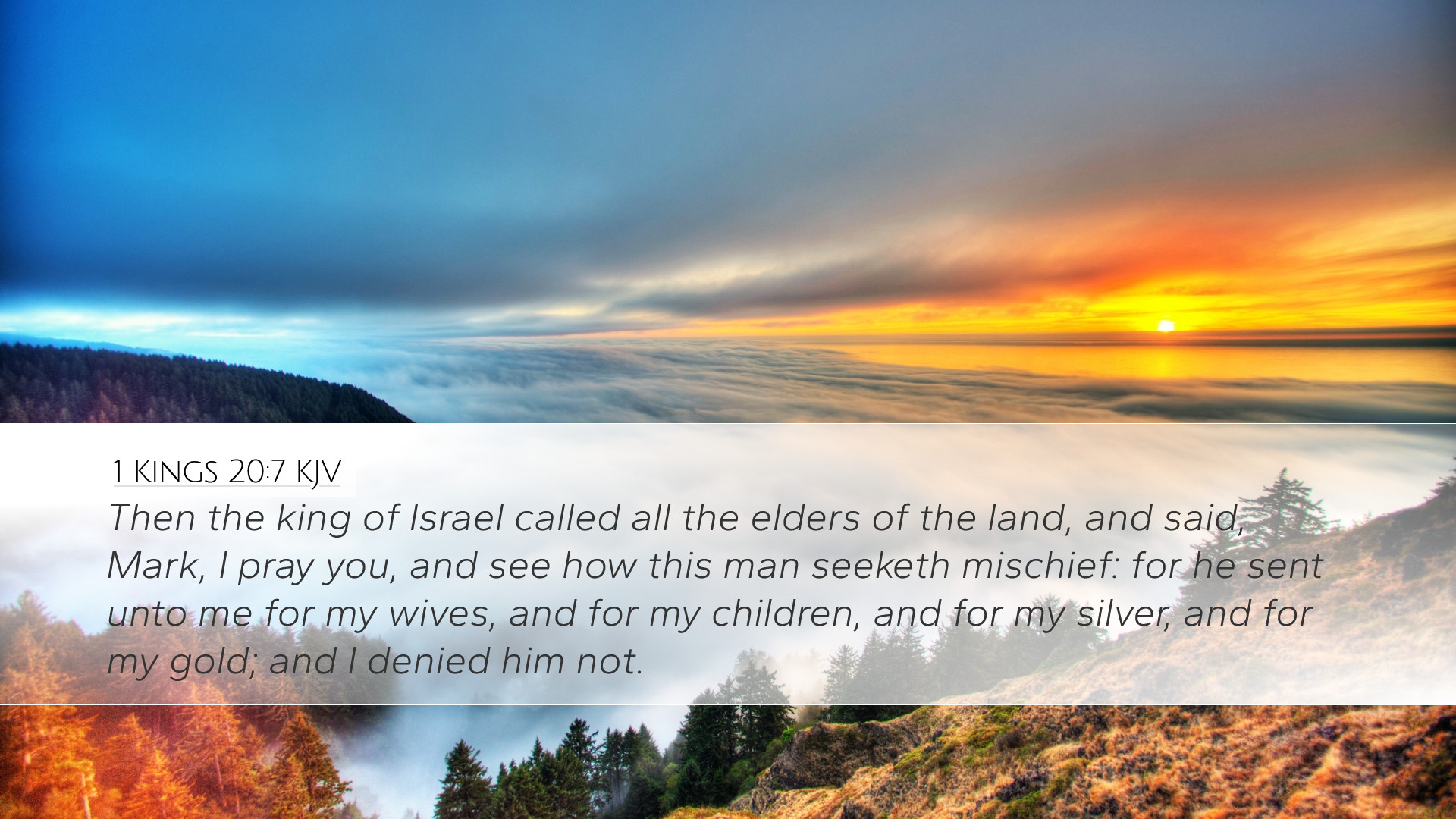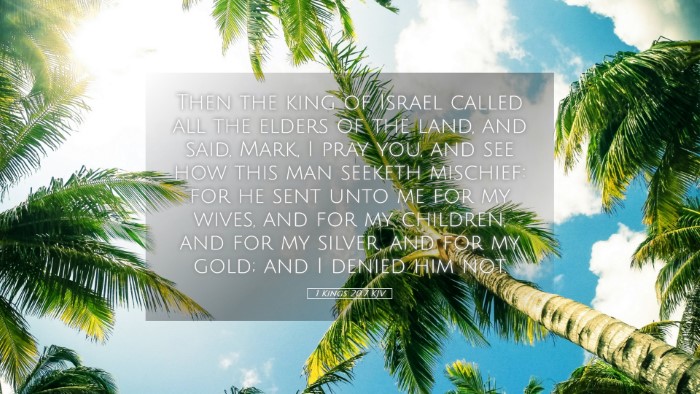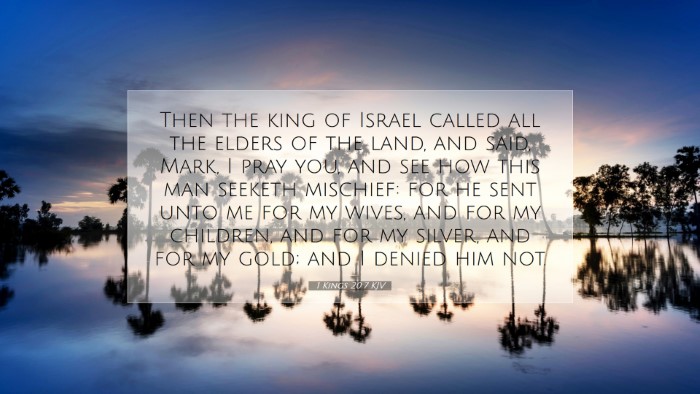Commentary on 1 Kings 20:7
Verse: 1 Kings 20:7 - "Then the king of Israel called all the elders of the land and said, 'Mark, I pray you, and see how this man seeketh mischief: for he sent unto me for my wives, and for my children, and for my silver, and for my gold; and I denied him not.'
Contextual Overview
This verse occurs within the larger narrative of King Ahab of Israel and his conflict with Ben-Hadad, king of Aram (Syria). This chapter reveals both the political machinations between these kings and the spiritual implications of their actions. The plea of Ahab to the elders signifies a moment of reflection on the leaders' roles and responsibilities in times of adversity.
Insights from Public Domain Commentaries
Matthew Henry's Commentary
Henry emphasizes the responses of Ahab to Ben-Hadad's demands, highlighting the moral implications of yielding to external pressure. He notes that Ahab’s initial agreement to surrender everything reflected a lack of discernment and a weakness in leadership. Henry explicates on the seriousness of Ahab invoking the wisdom of the elders, underscoring the importance of collective counsel amid crisis.
- Leadership and Counsel: Henry posits that wise leaders seek the counsel of their peers, particularly in threatening situations. Ahab acknowledges that the well-being of Israel was at stake, and he desired guidance beyond his personal judgment.
- Understanding the Threat: Ahab characterizes Ben-Hadad's request as one of 'mischief,' suggesting that he viewed it as an act laden with treachery. This recognition of the threat is critical as it reveals a shift in Ahab’s perception of his adversary and the nature of the demands made.
Albert Barnes' Notes on the Bible
Barnes explores the passage by drawing attention to the political dynamics at play. He interprets Ahab's concerns over his wives, children, and possessions as indicative of his insecurities as a king. Ahab's reluctance to consent initially speaks to a conflicting sense of duty to protect his family's honor against pressures from Ben-Hadad.
- Implications of Warfare: Barnes highlights the gravity of warfare in the ancient world, involving family honor as well as material wealth. Ahab's appeal to the elders indicates an acute awareness of the consequences of war for both domestic and international spheres.
- The Role of Elders: Echoing Henry's sentiment, Barnes notes the significance of consulting experienced leaders within the community. This act shows Ahab's recognition that leadership is not undertaken in isolation; it requires collaboration and accountability.
Adam Clarke's Commentary
Clarke's exposition dives deeply into the psychological aspects of Ahab’s character. Ahab's plea to the elders reveals not just his desperation but also a pivotal moment of self-awareness as a ruler. Clarke notes that Ahab's fear of losing everything forced him into a rare moment of vulnerability, thereby exposing his leadership weaknesses.
- A Recognition of Vulnerability: Clarke asserts that Ahab's acknowledgment of Ben-Hadad's demand illustrates the pressure kings faced at that time and the delicate balance between strength and defensiveness.
- Divine Intervention: Clarke also hints at the role of God’s overarching plan in facilitating circumstances to protect His people, suggesting that Ahab’s engagement with the elders might lead to a divine resolution.
Theological Reflections
This verse provides rich grounds for theological reflection, particularly in the realm of leadership, accountability, and the divine providence observed through seemingly dire human circumstances. Each commentary reflects a consensus on the necessity of wise counsel in shaping decisions, especially in moments of crisis.
- Leadership Lessons: For pastors and church leaders, this passage serves as a reminder that seeking input from knowledgeable advisors is crucial to navigate the complexities of leadership within congregations and communities.
- Faith and Fear: The tension between faithfulness to God’s guidance versus the fear of compromising one's values in the face of pressure is a recurring theme in Ahab's narrative, making it a poignant case study for theology students.
- Divine Sovereignty: Scholars may consider how God’s sovereignty works through the decisions and mistakes of leaders like Ahab, shaping the trajectory of His people toward eventual redemption.
Conclusion
1 Kings 20:7 stands as a critical juncture in the narrative of Ahab’s reign, encapsulating the complex interplay of human governance, divine oversight, and the moral consequences of leadership choices. The insights gathered from esteemed public domain commentaries highlight that understanding the dynamics of leadership involves moral discernment, relational integrity, and an acute awareness of the broader implications of one's decisions. As such, this passage invites readers—be they pastors, theologians, or students—to engage deeply with the text, its context, and its implications for contemporary leadership and faith in God.


